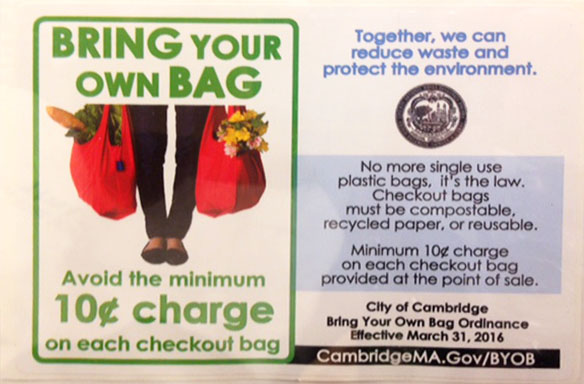Comprehensive bag laws usually include the following to increase sustainability:
- A ban on single-use plastic shopping bags. (This is often defined as any bag that is not reusable.)
- Require paper bags to have recycled content. The usual standard is "at least 40% post-consumer recycled content" based on California precedent. This regulation reduces the environmental impact from paper production. A side effect of this requirment is to increase the demand for recycled paper, which can benefit municipal recycling programs.
- Set minimum durability standards for reusable shopping bags. This is usually done with a minimum thickness. The best laws use 4 mils, which follows earlier legislation in Portland, Oregon from 2011 and later adopted in other major cities. Additional requirements may include stitched handles, and minimum load carrying ability. In order to avoid simply substituting thicker polyethylene bags, the Massachusetts Sierra Club model legislation bans all polyethylene bags (including PETE) as well as toxic polyvinyl chloride (PVC) no matter what the thickness. This leaves polypropylene (the most common reusable bag material), and washable natural fibers such as cotton.
- A fee to reduce consumption of all allowed bags. However, only cities in Massachusetts can directly set fees. The higher the fee, the fewer bags that will be used, and the more reusable bags will be adopted. A fee of 10¢ is the standard in California, which has been frequently followed elsewhere around the country (although a few communities adopted 25¢!).
Many jurisdictions allow plastic bags that meet American Society for Testing and Materials (ASTM) International standards. At a minimum this includes ASTM D6400, the “Standard Specification for Compostable Plastics”, and ideally requires additional standards to reduce long-term litter such as ASTM D7081, "Standard Specification for Biodegradable Plastics in the Marine Environment" or backyard compostability. Compostable plastic films (sometimes marked miscellaneous resin code #7) should contain bioplastic made from plant material to avoid the harms of petrochemicals, and furthermore these should come from crop waste not the crops themselves (such as corn). However, for single-use shopping bags, there is generally no need to allow compostable plastic bags in bag regulation.
While large stores, especially grocery stores and pharmacies, account for the vast majority of plastic bags, bringing all stores under bag regulation will have the greatest environmental impact and reduce consumer confusion. Some jurisdictions phase in compliance for smaller or non-chain stores, to allow for these stores to use up existing stock, and to reduce the short-term impact on limited municipal enforcement staff.
Finally, shopping bags are only part of the plastic problem. Massachusetts is the only state with laws that include produce bags in bag regulations. Produce bag regulations usually ban polyethylene produce bags and allow traditional paper or compostable plastic in addition to reusable produce bags.
Effective date: most laws use between six months and a year from date of passage. Fixed dates are preferable since they are unambiguous and predictable. Many communities choose January 1st or July 1st for the date since these align with calendar or fiscal years. Most importantly, this period allows for the development of education and outreach programs prior to the effective date. This might include distributing free resuable bags to vulnerable populations at municipal buildings, senior and community centers, and senior and low-income housing. Many places have held events to make reusable bags from old clothes.
Enforcement agency: Massachusetts cities often have Inspectional Services. Towns typically use the Department of Public Health. Some communities use the Department of Public Works.
Model City Ordinance for Plastic Bag Reduction - includes a bag fee
Model Town By-Law for Plastic Bag Reduction - basically the same as above, but slightly modified for towns
